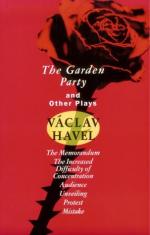|
This section contains 3,850 words (approx. 13 pages at 300 words per page) |

|
SOURCE: "Time, Identity and Being: The World of Václav Havel," in Twentieth-Century European Drama, edited by Brian Docherty, St. Martin's Press, 1994, pp. 172-82.
In the following essay, Majer examines the influence of totalitarian oppression and imprisonment on Havel's existentialist concept of time, individual identity, and the possibility of meaning in his dramatic works.
In his first speech to the Federal Assembly in Prague (25 January 1990), playwright Václav Havel, in his new role as President of the Republic of Czechoslovakia, focused on the phenomenon of time:
In my offices in the Prague Castle, I did not find one single clock. To me, that has a symbolic meaning: for long years, there was no reason to look at clocks, because time had stood still. History had come to a halt, not only in the Prague Castle but in the whole country. So much faster does it roll forward now...
|
This section contains 3,850 words (approx. 13 pages at 300 words per page) |

|


